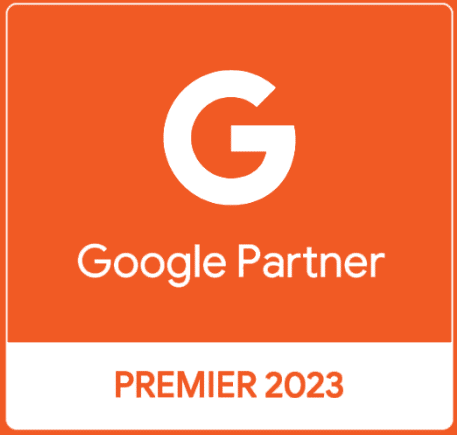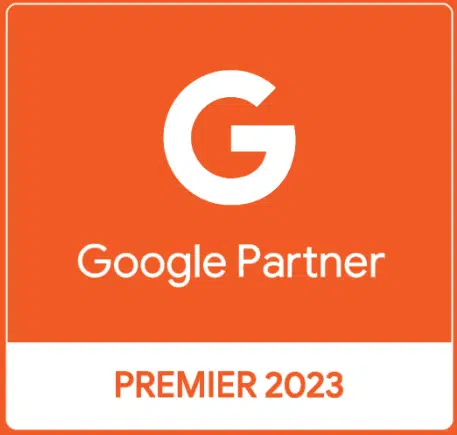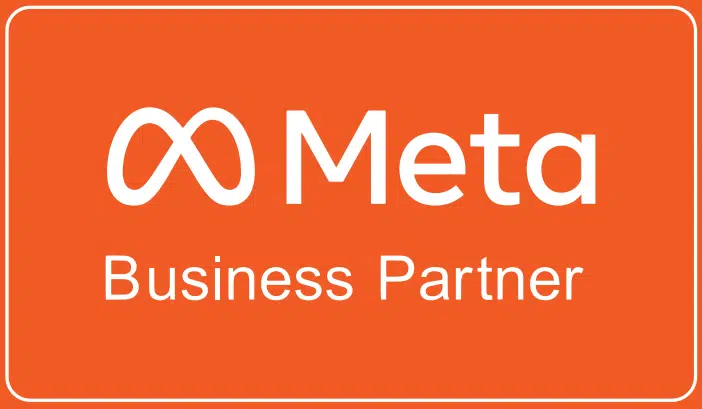Struggling with Poor Google Ads Performance? Find Out What’s Wrong and How to Fix It! — Google Ads Mistakes
It’s frustrating to invest time and money into ads that just don’t perform. Google Ads’ common mistakes can be the hidden culprits behind wasted budgets and missed opportunities. These errors, whether from neglected settings or misaligned strategies, can severely impact your ROI and stunt your growth.
At Magic Clickz, a top-rated digital marketing agency, we’ve seen it all. We know that pinpointing these Google Ads mistakes to avoid is crucial for your campaign’s success. This blog will not only uncover the prevalent mistakes that might be sabotaging your efforts but also offer you effective Google Ads success strategies and an insightful Google Ads optimization guide. Get ready to transform your approach with essential Google Ads campaign management tips and finally achieve the results you’ve been aiming for!
Here are the Common Google Ads Mistakes that can hinder your success:
Forgetting to Keep Track of Your Search Queries
One of the most overlooked yet crucial Google Ads mistakes is failing to monitor your search queries. This essential step can significantly impact your campaign’s success.
Why it’s a problem: Not reviewing your search keywords regularly can lead to wasted ad spend on irrelevant clicks. You might miss out on high-performing search terms that could boost your campaign’s effectiveness.

How to avoid it:
- Regularly Review: Frequently examine your search keywords to identify which terms are driving the most clicks and conversions. This helps in fine-tuning your targeting.
- Use Reports: Access the keyword search report from the Keywords page in your project or Ad Group. You can also set up a scheduled report to receive this data via email on a weekly basis.
- Optimize Continuously: By thoroughly reviewing your search term statistics, you can find new keywords to add to your profile and eliminate those that waste your budget.
- Filter Google Shopping Queries: For Google Shopping campaigns, review the search phrases triggering your ads and use campaign priority settings to filter out low-intent or low-conversion queries.
Taking advantage of the search terms report is vital for maintaining consistent website rankings and attracting new customers.
Overbidding on Keywords
Bidding aggressively might seem like the best way to secure top ad placements, but overbidding can drain your budget quickly without always improving your ad’s position. It’s crucial to strike the right balance.
Why it’s a problem: Overbidding can inflate your Cost-Per-Click (CPC), leading to higher expenses without a proportional increase in performance. You may end up spending more without seeing better results.
How to avoid it:
- Leverage Tools: Use Google Keyword Planner to identify optimal bidding strategies that maximize ROI while controlling costs.
- Bid Smart: Instead of always aiming for the top spot, bid strategically to target positions that deliver the best results for your goals.
- Monitor and Adjust: Regularly review your bidding strategy and adjust based on performance data to ensure you’re not overspending.
Relying on Default Campaign Settings
What happens: When setting up a new campaign, Google offers default settings that are meant to apply broadly to many advertisers. While convenient, these settings may not align with your specific goals and can limit the performance of your campaign.
Why it’s a problem: For instance, Google often sets campaigns to target both the Search and Display Networks by default. This broad targeting can lead to lower-quality clicks if your product or service isn’t well-suited for the Display Network.
How to avoid it:
- Customize goals: Set unique goals for each campaign. For example, an awareness campaign may prioritize impressions, while a sales-driven campaign should focus on conversions. This is a crucial step in Google Ads campaign management strategies.

- Adjust network settings: If your objective is purely search-based, ensure that your ads are only displayed on the Search Network, excluding Google search partners and the Display Network unless you have a specific need for them. This aligns with Google Ads’ best practices.

- Fine-tune bidding strategies: Choose a bidding strategy that reflects your campaign goals. For example, if you’re running a lead generation campaign, opt for a Target CPA (Cost Per Acquisition) strategy to maximize conversions within your target budget. Understanding Google Ads bidding strategies is key here.

- Location and ad schedule settings: Don’t rely on broad location targeting. If your business serves specific regions, ensure your ads only appear in those areas. Similarly, schedule your ads to run during hours when your target audience is most active. These are essential aspects of the Google Ads optimization guide.
Ignoring Proper Ad Copy Testing
What happens: Many advertisers either don’t test their ad copy enough or overload their ad groups with too many ad variants. Without proper testing, you may be missing out on ad copy that resonates best with your audience.
Why it’s a problem: If you run only one ad in each ad group, you won’t have any point of comparison to know if your messaging is effective. On the other hand, too many ad variations can dilute your data and make it difficult to determine what works best.
How to avoid it:
- Structured testing: Begin with 2-4 ad variants in each ad group. This balance provides enough variety to test different messages without overwhelming the system. This is one of the key Google Ads tips and tricks.

- Monitor and optimize: After running the ads for a sufficient period (e.g., a few weeks or a month), pause the underperforming ads and introduce new variants. Continually refine your ad copy based on performance data to ensure you’re delivering the most effective messaging. This is part of PPC optimization.
- A/B testing: Consider A/B testing elements like headlines, descriptions, and calls to action to find the combinations that yield the highest click-through rates and conversions. This approach is integral to Google Ads’ success strategies.
Automatically Applying Google’s Recommendations
What happens: Google frequently provides recommendations aimed at improving campaign performance. While these recommendations can be useful, they are often based on generalized best practices and might not suit your specific campaign needs.
Why it’s a problem: Blindly applying recommendations, such as increasing budgets or adding more keywords, could lead to overspending or targeting irrelevant audiences, ultimately reducing your ROI.
Here is a list of the actions that can be automatically applied:
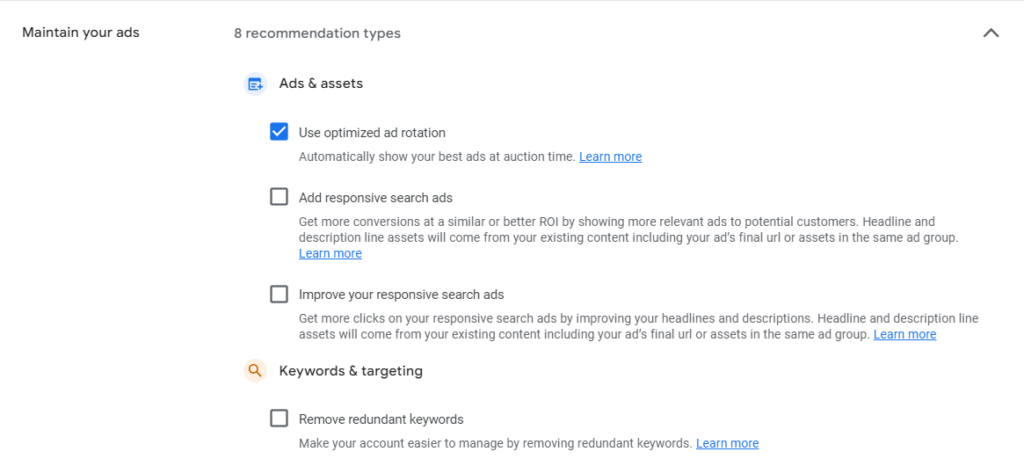
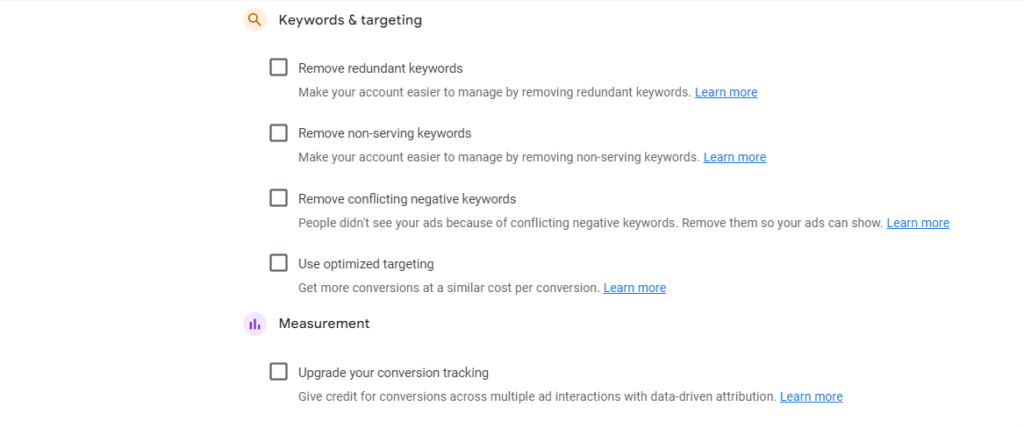
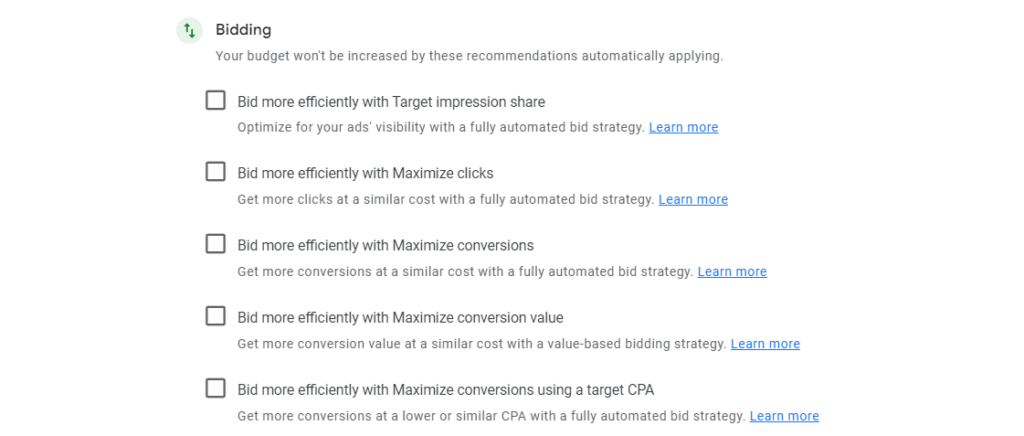
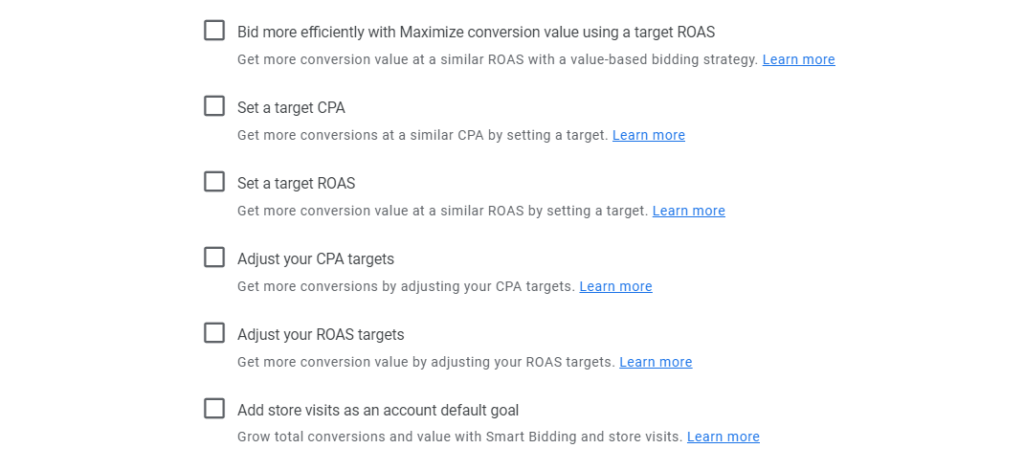
How to avoid it:
- Manual review: Before applying any recommendations, thoroughly review them to determine if they align with your campaign goals. This is crucial in avoiding Google Ads’ common mistakes.
- Selective implementation: Apply only the recommendations that make sense for your campaign. For example, if Google suggests adding broad match keywords, assess whether they fit within your targeting strategy or consider using them in a separate ad group for testing. This is part of effective Google Ads campaign management tips.
- Keep control: Maintain control over your campaigns by prioritizing your strategic insights over automated suggestions. Google’s recommendations should be treated as helpful advice, not as directives.
Setting and Forgetting Your Campaigns
What happens: Once a campaign is live, some advertisers fall into the trap of neglecting it, assuming that Google will optimize everything for them. This approach can result in missed opportunities for optimization and wasted ad spending.
Why it’s a problem: Without regular monitoring and adjustments, your campaigns may not perform at their best, leading to suboptimal ROI and missed opportunities to refine targeting, bidding, and creative elements.
How to avoid it:
- Regular reviews: Set a schedule to review your campaigns at least once a week. Look at key metrics such as CTR (click-through rate), conversion rates, and ROI to identify any areas that need improvement. This is a crucial part of Google Ads campaign management strategies.
- Optimization opportunities: Make adjustments based on performance data. For example, if certain keywords are driving a lot of clicks but few conversions, consider pausing them or adjusting your bidding strategy. This aligns with PPC campaign management.
- Budget adjustments: If you notice that certain campaigns are outperforming others, consider reallocating your budget to maximize your ROI. This is a key component of the Google Ads optimization guide.
Neglecting Landing Page Quality
What happens: An effective ad can only do so much if your landing page fails to deliver. Many advertisers focus heavily on creating compelling ads but overlook the importance of optimizing the landing page where users arrive.
Why it’s a problem: A poorly designed or irrelevant landing page can lead to high bounce rates, low-quality Scores, and ultimately, wasted ad spend as users leave without converting.

How to avoid it:
- Ensure relevance: Make sure your landing page content matches the ad copy. If your ad promotes a specific product or offer, the landing page should focus on that exact product or offer, not a generic homepage. This is a crucial part of Google Ads best practices.
- Simplify design: Keep the design clean and focused. Too many distractions, such as multiple calls-to-action or excessive navigation options, can confuse visitors and reduce conversions. This aligns with PPC best practices.
- Optimize for mobile: With a significant portion of traffic coming from mobile devices, ensure that your landing pages are mobile-friendly. Test them on various screen sizes to ensure a seamless user experience. This is important for Google Ads tips and tricks.
- Fast load times: A slow-loading landing page can frustrate users and lead to high bounce rates. Use tools like Google PageSpeed Insights to identify and fix any issues that may be slowing down your page. This is part of PPC optimization.
Overlooking the Power of Remarketing

What happens: Many advertisers focus solely on attracting new visitors but fail to capitalize on the potential of remarketing to re-engage users who have already interacted with their website.
Why it’s a problem: Remarketing allows you to target users who have shown interest in your product or service but didn’t convert on their initial visit. Ignoring remarketing can result in missed opportunities to bring back these potential customers.
How to avoid it:
- Set up remarketing lists: Use Google Ads’ Audience Manager to create remarketing lists based on user behaviour. For example, you can target users who visited a specific page or spent a certain amount of time on your site. This is a key component of Google Ads campaign management.
- Tailored ads: Create ads that specifically speak to your remarketing audience. For instance, if a user added a product to their cart but didn’t complete the purchase, you can show them ads featuring that product with a special discount. This is crucial for Google Ads’ success strategies.
- Cross-channel remarketing: Extend your remarketing efforts beyond the Google Display Network by using YouTube, Gmail ads, and even remarketing on social media platforms like Facebook. This aligns with PPC campaign management.
Picking the Wrong Keywords
What happens: Many advertisers make the mistake of selecting too many keywords, including broad or irrelevant terms that don’t align with user intent. This can lead to wasted budget and low-quality traffic.
Why it’s a problem: If your keywords are too broad or irrelevant, your ads will appear for searches that don’t align with your offerings. This results in low click-through rates and poor conversion rates.

How to avoid it:
- Focus on intent: Prioritize high-intent keywords that indicate a strong likelihood of conversion. For example, a keyword like “buy ergonomic office chair” suggests a user who is ready to make a purchase, whereas “ergonomic chair benefits” might attract users still in the research phase. This is part of the Google Ads optimization guide.
- Use negative keywords: Implement negative keywords to exclude terms that aren’t relevant to your business. This will help refine your targeting and ensure your ads appear only for searches that matter. This aligns with Google Ads best practices.
- Continuous refinement: Regularly review your keyword performance and remove or adjust keywords that aren’t delivering results. Tools like the Search Terms report can help you identify which keywords are driving irrelevant traffic. This is crucial for PPC mistakes.
Failing to Track and Analyze Performance
What happens: Some advertisers set up their Google Ads campaigns and fail to implement proper tracking or analysis of their performance data. This lack of insight prevents them from understanding what’s working and what needs improvement.
Why it’s a problem: Without tracking key metrics and analyzing performance data, you miss out on opportunities to optimize your campaigns, reduce waste, and improve ROI.
How to avoid it:
- Set up conversion tracking: Ensure that conversion tracking is properly configured so you can measure the effectiveness of your ads. This includes setting up goals in Google Analytics and linking your Google Ads account. This is a key aspect of the Google Ads optimization guide.
- Analyze data regularly: Review performance metrics such as CTR, CPC, and conversion rates frequently. Use this data to make informed decisions about adjusting your bidding strategies, ad copy, and keywords. This is essential for PPC campaign management.
- Leverage reporting tools: Utilize Google Ads’ reporting features to generate detailed reports on campaign performance. These reports can provide insights into what’s driving your best results and help you refine your strategy. This is a part of Google Ads campaign management tips.
By avoiding these common pitfalls and implementing Google Ads success strategies, you can significantly enhance your campaign performance and achieve better results. For more insights and advanced strategies,
Transform Your Google Ads with Magic Clickz ROI-Driven Digital Marketing Agency
Feeling frustrated with your Google Ads results?
You’re not alone, and the solution is closer than you think. At Magic Clickz, recognized as the best digital marketing agency in Indore, we leverage over 15 years of expertise to turn underperforming campaigns into powerful success stories. Our dedicated team offers top-notch Google Ads services and PPC management services, with a proven track record of delivering exceptional results for clients across various industries. We’re ready to bring that same expertise to your Google Ads strategy.
Why Hire Magic Clickz?
- Expertise That Delivers: With over 15 years in the industry, we understand the intricacies of Google Ads and how to maximize its potential for your business. Our deep knowledge of Google Ads optimization guide, Google Ads success strategies, and digital marketing ensures that your campaigns are set up for success.
- Proven Success: Our portfolio of successful case studies showcases our ability to drive outstanding results and transform campaigns. We’ve consistently applied Google Ads best practices, PPC campaign management strategies, and PPC management services to deliver exceptional outcomes.
- Hands-On Support: From setting up campaigns to ongoing optimization, we provide comprehensive support and guidance every step of the way. Our approach includes Google Ads campaign management tips, PPC optimization, and PPC management services to ensure your ads perform at their best.
- Local Knowledge: As the best digital marketing agency, we have a deep understanding of the local market and can tailor your campaigns to reach your ideal customers effectively. Our expertise in local PPC best practices, Google Ads tips and tricks, and digital marketing will give your campaigns a competitive edge.
Explore our recent case studies to see firsthand how we’ve transformed campaigns and driven impressive ROI for our clients through Google Ads optimization guide, PPC best practices, and Google Ads services. Don’t let another day of missed opportunities pass you by. For tailored, results-driven strategies and hands-on support from industry experts, contact Magic Clickz today. Let us show you why we’re the best digital marketing agency and how our personalised approach can elevate your Google Ads to new heights.
Reach out now and unlock the true potential of your advertising efforts with insights into Google Ads’ common mistakes, PPC management services, and Google Ads success strategies!




